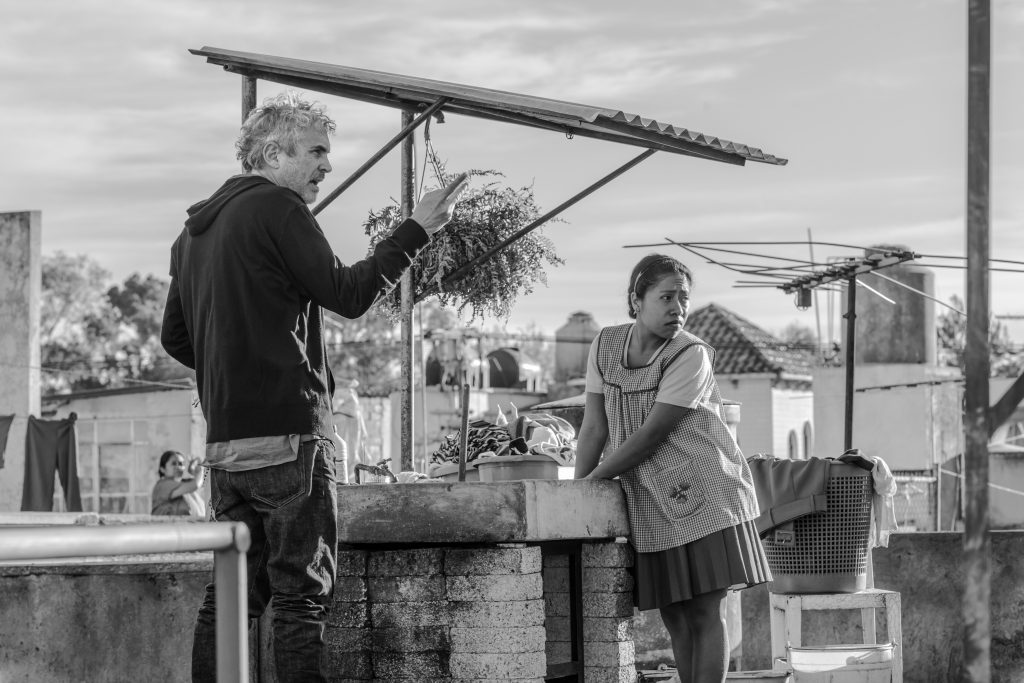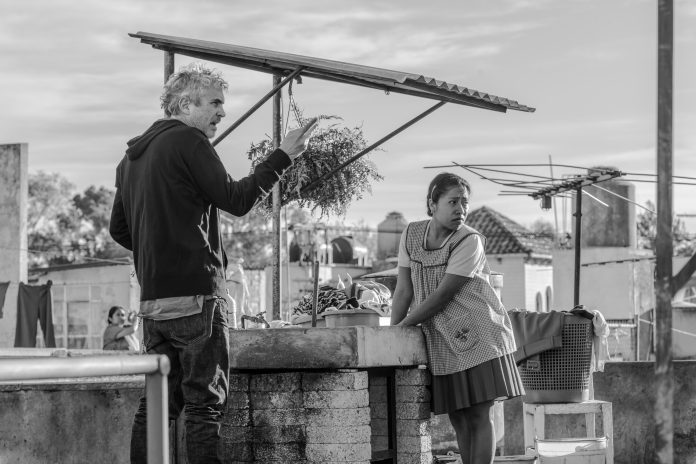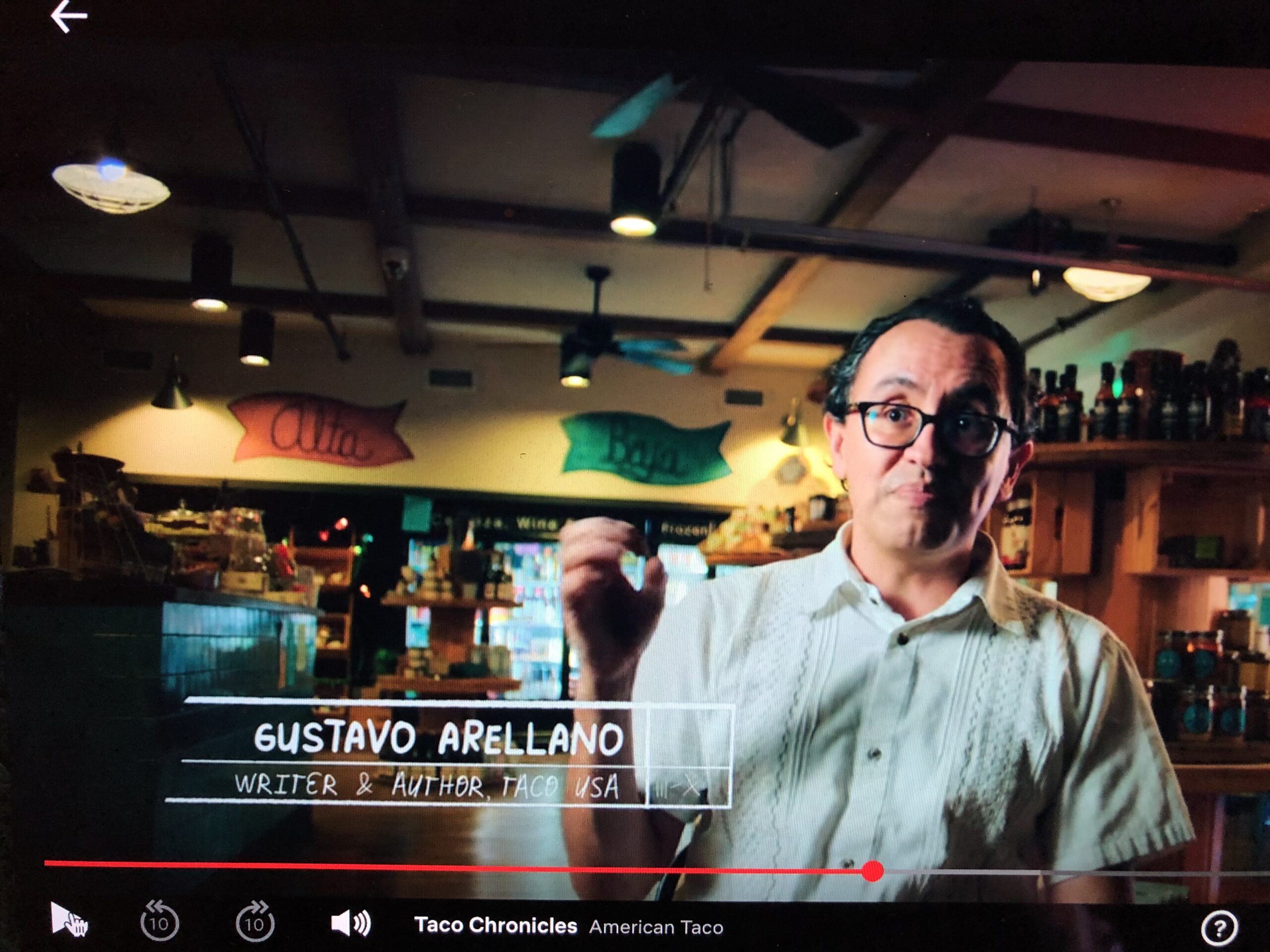As Mexican director Alfonso Cuarón walked two separate times from his table to receive Best Director and Best Foreign Language Film trophies at this year’s Golden Globe Awards for his critically acclaimed Roma, the song “Te He Prometido” (“I’ve Promised You”) by Argentinian composer and singer Leo Dan played in the background.
While unfamiliar to many of the Anglo members in the audience at the awards, those who have followed Cuarón’s career know that the song wasn’t just some random Spotify stream. The Mexican director, like Stanley Kubrick or Martin Scorcese before him, has long synched tunes in his films to reflect not only the action and era in which the plot is set, but also to serve as metaphors for his characters and the world they inhabit.
“Alone and heartbroken you have left me,” Dan sang as Cuarón made his way to the stage, much like the state of despair for Roma’s two female leads, the middle-class Sofi (Marina de Tavira) and her indigenous housekeeper, Cleo (Yalitza Aparicio).
American film critics have rightfully praised Roma for its cinematography, direction, actors, and more. But those scribes — most likely because they don’t speak Spanish or are familiar with the songs on Roma — have largely missed out on how Cuarón has brilliantly soundtracked the Mexico of the 1970s in his film.

Roma doesn’t have a music score, and Cuarón didn’t need it. Lynn Fainchtein, (the film’s music supervisor) captured the songs and sounds of 1970s Mexico City, from the sound of planes in the sky, to the gushing sounds of water when Cleo is cleaning or washing, to the afilador de cuchillos on his bike announcing with his whistle that he’s outside to sharpen your knives.
But it’s the song selection that is especially captivating. The socioeconomic clash of the time and personal turmoil plays out in the music each character listens to while going on about their day. For many who watched the film, and either lived in Mexico during this era, or listened to these songs while growing up, the movie serves as a time machine, a vivid reminder of the Mexico they left behind, or a recollection of a time spent with a loved one.
The domestic drama of the film plays out in the shadow of El Halconzo, a student massacre that took place on June 10, 1971 at the hands of a trained paramilitary group comprised of young men who came from Mexico City’s poorer neighborhoods. Early on during the film, we see Cleo’s love of popular music. She picks up dirty laundry while she carries a handheld radio and sings along with “Te He Prometido,” a song that talks about being heartbroken and scorned by the one you loved and trusted.
The sing-along gets interrupted when Cleo’s fellow domestic worker lets her know that Cleo’s love interest (Jorge Antonio Guerrero) is on the phone. The song lyrics foreshadow his actions towards Cleo, and how this will influence her state of mind.
Later, we see Cleo washing clothes by hand in the lavadero. While scrubbing the soapy clothing, she sings along to Juan Gabriel’s “No Tengo Dinero.” Much like Cleo being a domestic worker who deeply cares about the family she works for with little in terms of financial reward, Juan Gabriel’s masterpiece sings about a poor boy who has has no money to give to his amor, just love.
Roma’s women characters get the tender, heartsick ballads and also makes the powerful point that mujeres get oppressed regardless of class. In one scene, Sofi purposefully grinds her husband’s Ford Galaxie against the walls of a garage as Lupita D’Alessio “Mi Corazon es un Gitano,” which mourns a lost love, much like Sofi is mourning her crumbling marriage. As Sofi stumbles her way to the door where Cleo is waiting for her, she says to Cleo: “We are alone. No matter what they tell you, we women are always alone.”
In another scene, Cleo sings a Mixtec lullaby called “Cilhu” while she puts one of Sofi’s kids to bed. It showed her motherly instinct and genuine love for Sofi’s children. This tender care is, after all, what Cuarón wanted to portray, as the reflection of his own upbringings and gentle care of his real-life nanny, Liboria “Libo” Rodríguez.
Roma’s men, meanwhile, get rough songs or those that mock their pretensions.
When we meet Dr. Antonio (Fernando Grediaga), Sofi’s husband, he maneuvers his way-too-big Ford Galaxie into the family’s tight garage as he listens to Berlioz’s Romantic soother “Symphonie Fantastique.” Cleo’s love interest, on the other hand, gets the fast-paced, bluesy “Ciudad Perdida” by Mexican rock band, La Revolución de Emiliano Zapata, as she drives to find him, as the city gets ready to explode in chaos. This isn’t the first time that Cuarón showcases a song by La Revolución de Emiliano Zapata: His 2001 film, Y Tu Mamá También, also features a song by the band, “Nasty Sex.”
While the men in the film were cold and heartless, Sofi and Cleo always showed love and affection no matter the circumstances they were facing. This connection of heartbreak and perseverance manifests itself in a banda de guerra that parades outside Sofi’s home twice: when Dr. Antonio abandons the family, and when Sofi, Cleo, and the kids return from their beach trip to Tuxpan and Sofi tells the family that Antonio will not be coming back.
Love begins and ends, Cuarón hints, but life marches on.










